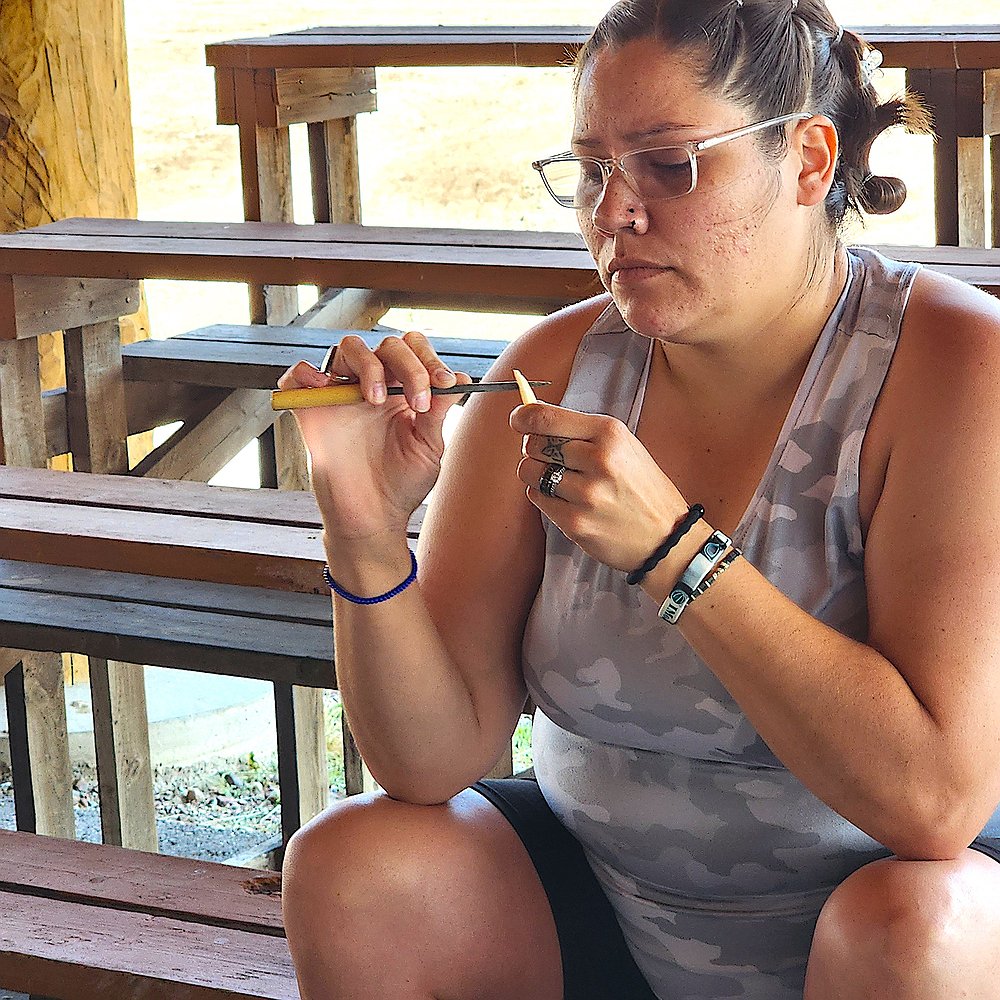Ksanka Culture Camp: Teaching the old ways
BERL TISKUS | Hagadone News Network | UPDATED 1 year, 5 months AGO
Reporter Berl Tiskus joined the Lake County Leader team in early March 2023, and covers Ronan City Council, schools, ag and business. Berl grew up on a ranch in Wyoming and earned a degree in English education from MSU-Billings and a degree in elementary education from the University of Montana. Since moving to Polson three decades ago, she’s worked as a substitute teacher, a reporter for the Valley Journal and a secretary for Lake County Extension. Contact her at [email protected] or 406-883-4343. | August 1, 2024 12:00 AM
Wayne McCoy was cutting wet, ultra-thin hide so children and adults could make small versions of traditional Kootenai canoes.
McCoy was one of several instructors forming Vernon Finley’s “crew” for Ksanka Culture Camp, held July 15-17 in Elmo. On Wednesday morning before the Standing Arrow Powwow, participants were completing projects and making smaller items.
Lillian Rose of Canada led participants in basket making. “She gathered cedar roots, cedar, pine needles, and different grasses,” said Finley, chair of the Kootenai Culture Committee. “She did twining and then the baskets themselves.”
Remi Still Smoking was finishing weaving a cedar basket using techniques she’d learned from Rose. She’d woven a strip of ponderosa pine, which is paler than cedar, and a strand of red sinew around her basket for contrast.
Using ponderosa pine needles, Claire Charlo had fashioned a small basket. She chose pine needles because “they’re everywhere.”
Nearby Mary Finley was also making a pine-needle basket, but she was just starting, using bright green thread for twining to contrast with the earthier tones of pine needles,
Fashioning a “baby” from pine needles with black yarn for hair, Maxine Michelle was ready to tuck the doll into its tiny birchbark cradleboard before attaching the cradleboard to a buckskin string. She’d seen Elmo resident Francis Auld wearing a similar necklace and wanted to make one for herself.
All the instructors and attendees were gathered in the dance arbor at the Standing Arrow PowWow grounds with a cool breeze gently ruffing everyone’s hair – everyone except the fire-starting group.
Finley said a group had been learning to make a fire without matches. It was afternoon of the second day before he heard a big cheer coming from their group.
“I told them they’d starve to death if it took two days to get a fire going,” Finley said, laughing.
The dollmakers were a little ahead of the fire-starters. Pulling fabrics from an overflowing tub, Marilyn Caye was demonstrating how to make a doll head. Most had the head finished and were moving onto bodies and clothing.
Her table was next to Rosemary Caye’s group of beaders. Strings of jewel-colored beads caught the light. Almost everyone was making a bracelet, some with leather ties. Soft talk and laughter were interspersed with questions for Rosemary or Marilyn.
Jordan Stasso came cruising in with shards of an elk femur and files of different size to transform the bone splinters into either a needle or an awl. Enjoying the company, Billie Rae Bear sat with Stasso’s group and worked on a bone breastplate for powwow wear.
Stasso also had elderberry branches to make containers to hold the implements just as the Kootenais had when needles were scarce and needed to be made by hand. Elderberry is pretty soft so the center can be scooped out to make a hollow tube. Stasso’s even had a tiny stopper made from a small hunk of elderberry, whittled to fit.
Alfred Joseph shared traditional uses of plants. He brought traditional materials and clothing items too.
Finley was already thinking of ways to tweak the Ksanka Culture Camp. He and his crew brainstorm ideas and put them all together. The goal is to emulate the old ways – to do what should be done when it was traditionally done, like picking huckleberries.
“July is Huckleberry Month, because right now the huckleberries are ready,” Finley said. They usually do a huckleberry camp too, but Finley, chuckling, said he wore out his crew.
By noon, bracelets were being beaded, canoes shaped, dolls clothed, baskets woven, awls and needles filed, and elderberry containers scooped in a setting where traditional skills were being learned and passed on.
ARTICLES BY BERL TISKUS

Upgrades continue at Ronan Community Center
The Community Center in Ronan was dedicated in 1969, after untold months of work by the local Jaycees and Jayceens. “It’s been a very long time since it had an upgrade, just because there’s no money,” said Sjaan Vincent, Ronan fairgrounds manager.

City of Ronan welcomes Mark Nelson to council
Ronan City Council’s meeting on Jan. 14 began with a welcome for a new council member and new police officer, plus new office worker Gwen Zolder.

Winterfest draws crowd but no snow
It was about 40 degrees with not a tablespoon of snow on the ground at the Miracle of America Museum in Polson on Jan. 10. Despite the balmy temperature, people gathered for the annual Winterfest, and examined the fleet of vintage snowmobiles on the museum’s front lawn.



